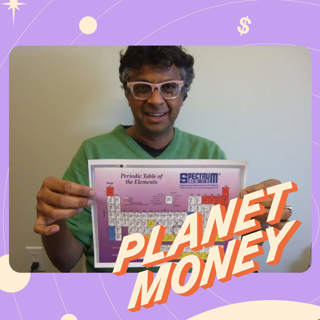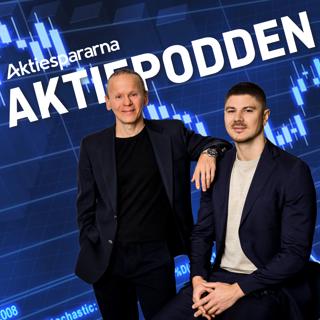
So you've been scammed, now what?
We are living in a kind of golden age for online fraudsters. As the number of apps and services for storing and sending money has exploded – so too have the schemes that bad actors have cooked up to steal that money. Every year, we hear more and more stories of financial heartbreak. What you don't often hear about is what happens after the scam?On today's show, we follow one woman who was scammed out of over $800,000 on her quest to get her money back. That journey takes her from the halls of the FBI to the fraud departments of some of the country's biggest financial institutions. And it offers a window into how the systems that are theoretically designed to help the victims of financial cybercrime actually work in practice. This episode was hosted by Alexi Horowitz-Ghazi and Jeff Guo. It was produced by Willa Rubin and edited by Keith Romer. It was engineered by Neal Rauch and fact-checked by Sierra Juarez. Alex Goldmark is Planet Money's executive producer.Help support Planet Money and hear our bonus episodes by subscribing to Planet Money+ in Apple Podcasts or at plus.npr.org/planetmoney.Learn more about sponsor message choices: podcastchoices.com/adchoicesNPR Privacy Policy
29 Maj 202427min

The junkyard economist
On today's episode, we ride through the streets of San Francisco with a long-time junkman, Jon Rolston. Jon has spent the last two decades clearing out houses and offices of their junk. He's found all sorts of items: a life-time supply of toilet paper, gold rings, $20,000 in cash. Over the years, he's developed a keen eye for what has value and what might sell. He's become a kind of trash savant.As we ride with Jon, he shows us the whole ecosystem of how our reusable trash gets dealt with — from metals (ferrous and non-ferrous) to tires to cardboard. And we see how our junk can sometimes get a second chance at life. If you can understand the junk market like Jon, you can understand dozens of trends in our economy. This episode was hosted by Erika Beras and James Sneed, and produced by James Sneed with help from Emma Peaslee. It was edited by Jess Jiang. Engineering by Josh Newell. It was fact-checked by Sierra Juarez. Alex Goldmark is Planet Money's executive producer.Help support Planet Money and hear our bonus episodes by subscribing to Planet Money+ in Apple Podcasts or at plus.npr.org/planetmoney. Learn more about sponsor message choices: podcastchoices.com/adchoicesNPR Privacy Policy
24 Maj 202425min

Anatomy of a layoff
By one estimate, 40 percent of American workers get laid off at least once in their careers. And when that happens, companies will often say, "It's not personal. It has nothing to do with you or your performance. We're just changing priorities, making a strategic shift." It's like the business version of: "It's not you, it's me." And just like a breakup, it feels terrible. This happened to a man we're calling V, who was working at the same company as his husband when he got laid off. And for V, the experience felt shocking. It left him and his husband with a lot of unresolved questions. On today's show, the story of that layoff. And we help that couple get some answers by taking their questions to an HR expert who gives the low-down on lay-offs. This story is adapted from a 3-part series on layoffs produced by Yowei Shaw for her show, Proxy. The layoff series was edited by John DeLore with research and reporting help from Kim Nederveen Pieterse. You can listen to the full layoff series from Proxy wherever you get your podcasts, and you can support the show and find out more by going to patreon.com/proxypodcast. And you can check out her original song "Gold Star" on Spotify and YouTube. Help support Planet Money and hear our bonus episodes by subscribing to Planet Money+ in Apple Podcasts or at plus.npr.org/planetmoney.Learn more about sponsor message choices: podcastchoices.com/adchoicesNPR Privacy Policy
22 Maj 202427min

The hack that almost broke the internet
Last month, the world narrowly avoided a cyberattack of stunning ambition. The targets were some of the most important computers on the planet. Computers that power the internet. Computers used by banks and airlines and even the military. What these computers had in common was that they all relied on open source software. A strange fact about modern life is that most of the computers responsible for it are running open source software. That is, software mostly written by unpaid, sometimes even anonymous volunteers. Some crucial open source programs are managed by just a single overworked programmer. And as the world learned last month, these programs can become attractive targets for hackers. In this case, the hackers had infiltrated a popular open source program called XZ. Slowly, over the course of two years, they transformed XZ into a secret backdoor. And if they hadn't been caught, they could have taken control of large swaths of the internet. On today's show, we get the story behind the XZ hack and what made it possible. How the hackers took advantage of the strange way we make modern software. And what that tells us about the economics of one of the most important industries in the world. Help support Planet Money and hear our bonus episodes by subscribing to Planet Money+ in Apple Podcasts or at plus.npr.org/planetmoney.Learn more about sponsor message choices: podcastchoices.com/adchoicesNPR Privacy Policy
17 Maj 202425min

Why Gold? (Classic)
In the past few months, the price of gold has gone way up – even hitting a new high last month at just over $2,400 per troy ounce. Gold has long had a shiny quality to it, literally and in the marketplace. And we wondered, why is that? Today on the show, we revisit a Planet Money classic episode: Why Gold? Jacob Goldstein and David Kestenbaum will peruse the periodic table of the elements with one goal in mind: to learn which element would really make the best money.This classic Planet Money episode was part of the Planet Money Buys Gold series, and was hosted by Jacob Goldstein and David Kestenbaum.This rerun was hosted by Sally Helm, produced by Willa Rubin, edited by Keith Romer, and fact-checked by Sierra Juarez. Alex Goldmark is our executive producer.Help support Planet Money and hear our bonus episodes by subscribing to Planet Money+ in Apple Podcasts or at plus.npr.org/planetmoney.Always free at these links: Apple Podcasts, Spotify, Google Podcasts, the NPR app or anywhere you get podcasts.Learn more about sponsor message choices: podcastchoices.com/adchoicesNPR Privacy Policy
15 Maj 202418min

Zombie mortgages are coming back to life
Karen McDonough of Quincy, Mass., was enjoying her tea one morning in the dining room when she saw something odd outside her window: a group of people gathering on her lawn. A man with a clipboard told her that her home no longer belonged to her. It didn't matter that she'd been paying her mortgage for 17 years and was current on it. She was a nurse with a good job and had raised her kids there. But this was a foreclosure sale, and she was going to lose her house. McDonough had fallen victim to what's called a zombie second mortgage. Homeowners think these loans are long dead. But then the loans come back to life because they get bought up, sometimes for pennies on the dollar, by debt collectors that then move to collect and foreclose on people's homes. On today's episode: An NPR investigation reveals the practice to be widespread. Also, what are zombie mortgages? Is all this legal? And is there any way for homeowners to fight the zombies? You can read more about zombie second mortgages online at: npr.org/zombie Correction: An earlier version of this episode description misspelled Karen McDonough's last name as MacDonough.Help support Planet Money and get bonus episodes by subscribing to Planet Money+ in Apple Podcasts or at plus.npr.org/planetmoney.Learn more about sponsor message choices: podcastchoices.com/adchoicesNPR Privacy Policy
10 Maj 202430min

Inside video game economics (Two Indicators)
Why do video game workers offer labor at a discount? How can you design a video game for blind and sighted players? Does that design have lessons for other industries?These and other questions about the business of video games answered in todays episode. The Indicator just wrapped a weeklong series decoding the economics of the video game industry, we're excerpting some highlights. First, we meet some of the workers who are struggling with the heavy demands placed on them in their booming industry, and how they are fighting back. Then, we check in on how game developers are pulling in new audiences by creatively designing for people who couldn't always play. How has accessibility become an increasingly important priority for game developers? And, how can more players join in the fun?You can hear the rest of our weeklong series on the gaming industry at this link, or wherever you get your podcasts. This episode was hosted by Wailin Wong, Darian Woods, and Adrian Ma. Corey Bridges produced this episode with help from James Sneed. It was edited by Kate Concannon, fact-checked by Sierra Juarez, and engineered by Robert Rodriguez with help from Valentina Rodríguez Sánchez. Alex Goldmark is Planet Money's executive producer.Help support Planet Money and hear our bonus episodes by subscribing to Planet Money+ in Apple Podcasts or at plus.npr.org/planetmoney.Learn more about sponsor message choices: podcastchoices.com/adchoicesNPR Privacy Policy
8 Maj 202418min

The birth of the modern consumer movement
Today on the show, the story of the modern consumer movement in the U.S. and the person who inspired it: Ralph Nader. How Ralph Nader's battle in the 1960s set the stage for decades of regulation and sparked a debate in the U.S. about how much regulation is the right amount and how much is too much. This episode was made in collaboration with NPR's Throughline. For more about Ralph Nader and safety regulations, listen to their original episode, "Ralph Nader, Consumer Crusader."This Planet Money episode was produced by Emma Peaslee and edited by Jess Jiang. The Throughline episode was produced by Rund Abdelfatah, Ramtin Arablouei, Lawrence Wu, Julie Caine, Anya Steinberg, Casey Miner, Cristina Kim, Devin Katayama, Peter Balonon-Rosen, Irene Noguchi, and fact-checking by Kevin Volkl. The episode was mixed by Josh Newell.Help support Planet Money and get bonus episodes by subscribing to Planet Money+ in Apple Podcasts or at plus.npr.org/planetmoney.Learn more about sponsor message choices: podcastchoices.com/adchoicesNPR Privacy Policy
3 Maj 202420min






















